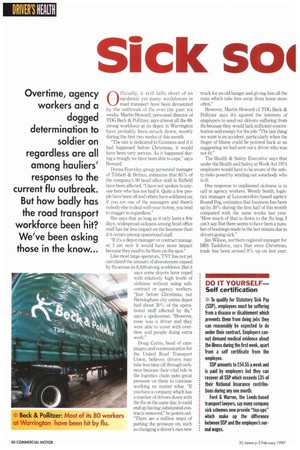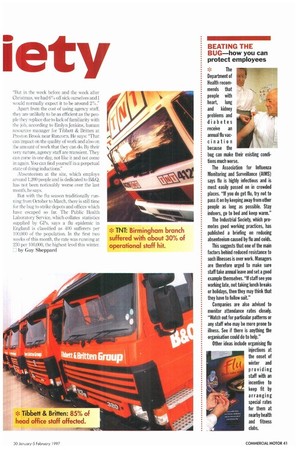Sick SOI
Page 42

Page 43

If you've noticed an error in this article please click here to report it so we can fix it.
letv
0 fficially, it still falls short of an epidemic yet many workforces in road transport have been devastated by the outbreak of flu over the past six weeks. Martin Howard, personnel director of TDG Beck & Pollitzer, says almost all the 80strong workforce at its depot in Warrington have probably been struck down, mostly during the first two weeks of this month.
"The site is dedicated to Guinness and if it had happened before Christmas, it would have been very serious. As it happened during a trough, we have been able to cope," says Howard.
Donna Fearnley, group personnel manager of Tibbett & Britten, estimates that 85% of the company's 90 head office staff in Enfield have been affected. 1 have not spoken to anyone here who has not had it. Quite a few people have been off and others have soldiered on; if you are one of the managers and there's nobody else to deal with your in-tray, you tend to stagger in regardless."
She says that as long as it only lasts a few days, widespread sickness among head office staff has far less impact on the business than if it occurs among operational staff.
"If it's a depot manager or contract manager, I am sure it would have more impact because they need to be there on the spot."
Like most large operators, TNT has not yet calculated the amount of absenteeism caused by flu across its 8,500-strong workforce. But it says some depots have coped with relatively high levels of sickness without using subcontract or agency workers. "Just before Christmas, our Birmingham city centre depot had about 30% of the operational staff affected by flu," says a spokesman. "However, none was a driver and they were able to cover with overtime and people doing extra work."
Doug Curtis, head of campaigns and communication for the United Road Transport Union, believes drivers may take less time off through sickness because their vital role in the logistics chain puts great pressure on them to continue working no matter what. "If you have a company which has a number of drivers down with the flu on the same day, it could end up having substantial contracts removed," he points out. "There are a million ways of putting the pressure on, such as changing a driver's nice new truck for an old banger and giving him all the runs which take him away from home more often."
However, Martin Howard of -MG Beck & Pollitzer says it's against the interests of employers to send out drivers suffering from flu because they would lack sufficient concentration and energy for the job: "The last thing we want is an accident, particularly when the finger of blame could be pointed back at us suggesting we had sent out a driver who was not fit."
The Health & Safety Executive says that under the Health and Safety at Work Act 1974 employers would have to be aware of the safety risks posed by sending out somebody who is ill.
One response to unplanned sickness is to call in agency workers. Wendy Smith, logistics manager at Leicestershire-based agency Round Peg, estimates that business has been up by 30% during the first half of this month compared with the same weeks last year. "How much of that is down to the flu bug, I can't say. But there seems to have been a number of bookings made in the last minute due to drivers going sick."
Jim Wilson, northern regional manager for BRS Taskforce, says that since Christmas, trade has been around 8% up on last year.
"But in the week before and the week after Christmas, we had 60 off sick ourselves and I would normally expect it to be around 2%."
Apart from the cost of using agency staff, they are unlikely to be as efficient as the people they replace due to lack of familiarity with the job, according to Emlyn Jenkins, human resources manager for Tibbett & Britten at Preston Brook near Runcorn. He says: "That can impact on the quality of work and also on the amount of work that they can do. By their very nature, agency staff are transient. They can com(, in one day, not like it and not conic in again. You can find yourself in a perpetual state of doing inductions."
Absenteeism at the site, which employs around 1200, people and is dedicated to B&Q, has not been noticeably worse over the last month, he says.
But with the flu season traditionally running from October to March, there is still time for the bug to strike depots and offices which have escaped so far. The Public Health Laboratory Service, which collates statistics supplied by GPs. says a flu epidemic in England is classified as 400 sufferers per 100,000 of the population. In the first two weeks of this month, the rate was running at 230 per 100,000, the highest level this winter. El by Guy Sheppard








































































































